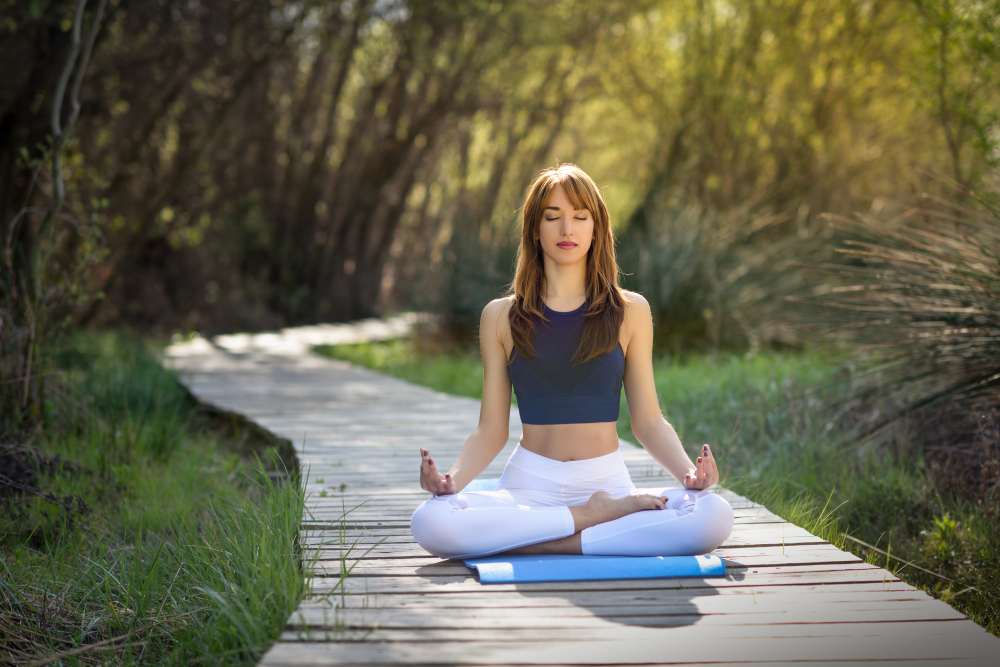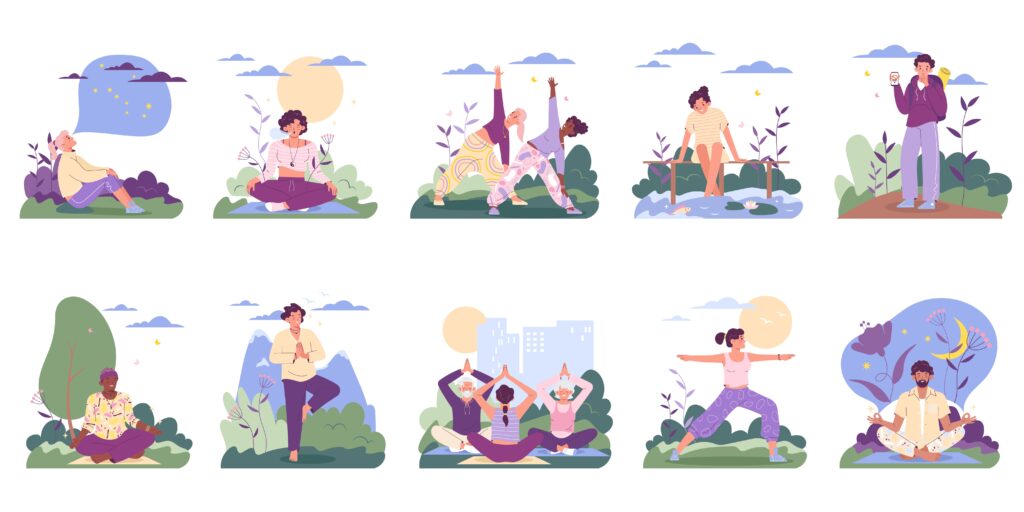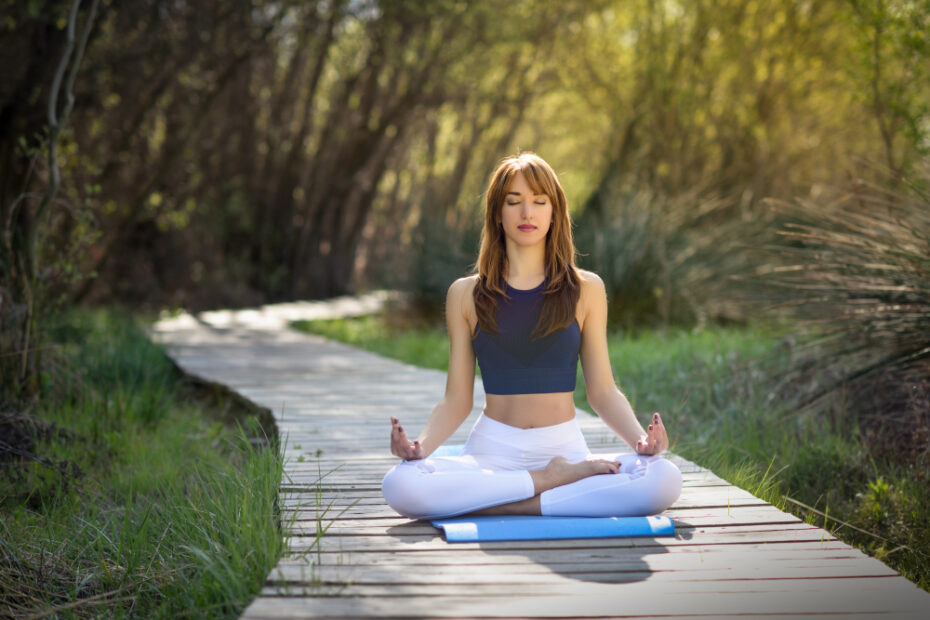Yoga, originating in ancient India, stands as a holistic practice that has transcended cultural borders to become a global phenomenon. The Ultimate Yoga guide seamlessly integrates physical postures, breath control, meditation, and ethical principles to foster holistic well-being. Let’s embark on a deeper exploration of how the Ultimate Yoga guide profoundly influences our lives.
Table of Contents
Yoga, originating in ancient India, stands as a holistic practice that has transcended cultural borders to become a global phenomenon. The Ultimate Yoga guide seamlessly integrates physical postures, breath control, meditation, and ethical principles to foster holistic well-being. Let’s embark on a deeper exploration of how the Ultimate Yoga guide profoundly influences our lives.
Yoga and Mental Clarity
The Calming Effect of Yoga
In our fast-paced, ever-evolving world, the quest for inner serenity can be an arduous one. Yoga, however, emerges as a sanctuary for the mind, offering individuals an escape from the tumultuous external world and a chance to discover solace within themselves. Through the art of deep breathing and mindful movements, yoga cultivates an oasis of calm and tranquility in our daily lives.
Stress Reduction
Among the myriad benefits of yoga, its remarkable capacity to alleviate stress takes center stage. Stress, a silent pandemic affecting millions globally, finds its adversary in yoga. Through its mastery of relaxation techniques, yoga orchestrates a symphony of calmness, lowering the levels of cortisol—the notorious stress hormone—in the body. This, in turn, not only alleviates stress but also nurtures superior mental well-being.
Improved Focus and Concentration
Regular engagement with yoga bestows a gift of enhanced cognitive prowess, such as sharpened focus and unwavering concentration. As one learns to be present on the yoga mat, this mindfulness extends gracefully into everyday life, fostering a heightened ability to tackle challenges and remain centered amidst chaos.

Physical Benefits of Yoga
Flexibility and Strength
The art of yoga, as encapsulated in its “asanas” or postures, meticulously caters to the enhancement of both flexibility and strength. These gentle yet potent movements gracefully stretch and fortify muscles, culminating in the attainment of a harmonious, robust physique.
Pain Relief
Yoga emerges as a natural antidote to an array of physical afflictions. Chronic conditions such as back pain, arthritis, and migraines often succumb to the healing touch of consistent yoga practice. Countless individuals have borne witness to profound relief from their agonies through the practice of yoga.
Better Posture
In an era marked by digital engagement and sedentary lifestyles, the scourge of poor posture looms large. Yoga emerges as the beacon of hope, encouraging the alignment of the spine and nurturing an acute awareness of one’s body. Over time, the fruits of these efforts manifest as a significant improvement in posture.
The Spiritual Connection
Yoga as a Spiritual Practice
Though yoga doesn’t align itself with any particular religion, it traces its roots to deep spiritual soil. It beckons individuals to embark on an inner odyssey, inviting them to forge connections with higher realms of consciousness. This spiritual dimension adds a layer of depth and meaning to the practice of yoga.
Inner Peace and Balance
The quest for inner peace stands as a universal endeavor. Yoga paves a path toward inner equilibrium, granting individuals the ability to find balance amidst life’s relentless tempests. This newfound equilibrium radiates in daily interactions and decision-making, creating a ripple effect of serenity.
Mind-Body-Soul Synchrony
Yoga, as an art form, orchestrates a harmonious convergence of the mind, body, and soul. The physical postures align seamlessly with the rhythm of breath, leading to a profound sense of unity with the cosmos. It is within this profound synchrony that the true potency of yoga resides.

Types of Yoga
Yoga, an expansive tapestry of practices, offers a plethora of forms, each catering to diverse needs and inclinations.
Hatha Yoga
Hatha yoga places its emphasis on physical postures and emerges as an ideal choice for novices. It serves as a solid foundation upon which other yoga styles may be built.
Vinyasa Yoga
Vinyasa yoga intricately weaves the threads of breath and movement into a dynamic and fluid practice. It not only nurtures cardiovascular fitness but also fosters a profound mind-body connection.
Kundalini Yoga
Kundalini yoga charts a course toward the awakening of dormant energy coiled at the base of the spine. Renowned for its transformative and spiritually enlightening effects, it unveils new dimensions of self.
Yoga and Stress Management
Cortisol Reduction
Chronic stress casts a long shadow, predisposing individuals to an array of health maladies. Yoga emerges as a guardian of long-term health, reducing cortisol levels and combating the relentless onslaught of stress.
Anxiety and Depression
Scientific studies affirm yoga’s efficacy in assuaging symptoms of anxiety and depression. The interplay of physical movement, breath control, and meditation constructs a sanctuary for mental healing and restoration.
Emotional Resilience
The practice of yoga fortifies emotional resilience, arming individuals with the tools required to navigate the undulating terrain of life with grace and equanimity.

Yoga for Physical Health
Weight Management
Yoga casts its influence over weight management by revving up metabolism and encouraging mindful eating. It fosters a holistic approach to wellness that transcends the boundaries of the yoga mat.
Cardiovascular Health
Regular yoga practice unfurls a red carpet to improved cardiovascular health. It lowers blood pressure, slashes cholesterol levels, and bolsters circulation, all coalescing to fortify the heart’s vitality.
Pain Management
For those ensnared by chronic pain, yoga extends a drug-free lifeline. It enhances flexibility and emboldens muscles, thereby alleviating the burden on aching regions of the body.
The Role of Breathing
Pranayama Techniques
The science of breath control, known as Pranayama, serves as a cornerstone of yoga. It augments lung capacity, purifies the respiratory system, and orchestrates serenity within the mind.
Deep Breathing for Relaxation
The simplicity of deep, diaphragmatic breathing belies its extraordinary potency as a relaxation technique. It instantaneously dissolves stress and ushers in a profound sense of well-being.
The Mind-Body Connection
Yoga’s unwavering focus on the interplay between breath and body fosters an unbreakable bond between physical and mental well-being. This synergy constitutes the bedrock of yoga’s effectiveness.
Yoga and Spiritual Growth
Meditation and Self-Discovery
Meditation, an integral facet of yoga, serves as the gateway to self-discovery. It extends an invitation to explore the inner landscape, offering glimpses into one’s true self.
Chakras and Energy Flow
Yoga acknowledges the presence of energy centers, known as chakras. Through the diligent practice of yoga, one can balance and activate these centers, thus embarking
on a transformative journey of spiritual growth.
Yoga Philosophy
Yoga transcends the confines of mere physical postures, embracing a profound philosophy that charts the course toward ethical living and purposeful existence.

Starting Your Yoga Journey
Finding the Right Class
The choice of the right yoga class stands as a pivotal decision. It necessitates a contemplation of personal goals, experience level, and an alignment with the chosen style of yoga.
Necessary Equipment
Participating in yoga doesn’t demand elaborate gear. A comfortable mat, suitable attire, and an open mind constitute the essentials.
Setting Realistic Goals
The path of yoga unfolds as a deeply personal journey. It beckons individuals to establish attainable goals and to celebrate each stride of progress, regardless of its size.
Yoga and Everyday Life
Mindful Eating
Yoga extols the virtues of mindful eating, cultivating a healthier rapport with food and nurturing holistic well-being.
Stress-Free Relationships
As one delves deeper into the practice of yoga, interpersonal relationships may undergo a transformation. The practitioner approaches conflicts with a composed demeanor, fostering healthier connections.
Work-Life Balance
Yoga imparts the wisdom of balance, urging its adherents to extend this principle to both professional and personal domains, resulting in a more fulfilling existence.
Yoga Misconceptions
Yoga is Only for the Flexible
Yoga’s embrace extends to all, regardless of flexibility or fitness levels. It champions progress, not perfection, and celebrates the individual journey.
Yoga is Religious
While yoga harbors spiritual dimensions, it stands independent of any specific religion. It offers a practice accessible to people of all faiths or those who embrace none.
Yoga is Just Stretching
Yoga’s embrace encompasses far more than physical stretching. It encompasses mental and spiritual facets, weaving a tapestry of holistic well-being.
The Future of Yoga
Integration with Modern Medicine
The medical community increasingly acknowledges yoga’s therapeutic prowess, hinting at its potential to become an integral part of mainstream healthcare.
Technological Advancements
Yoga adapts to the digital age with online classes, apps, and virtual communities, extending its reach to individuals worldwide.
Global Reach
Yoga’s influence continues its global expansion, fostering unity and mutual understanding across diverse cultures.
Conclusion
In a world where demands and distractions perpetually beckon us in myriad directions, the Ultimate Yoga guide emerges as a sanctuary for holistic well-being. Its transformative influence extends beyond the physical realm, delving deep into the domains of mind and spirit. Embrace the voyage of yoga, and you’ll unearth a path to a healthier, more harmonious, and spiritually awakened self.
FAQs
1. What is the best time of day to practice yoga?
The ideal time for yoga varies from person to person. Some find mornings invigorating, while others prefer evenings for relaxation. The key is to choose a time that aligns with your schedule and allows for consistent practice.
2. Can I do yoga if I have physical limitations?
Absolutely! Yoga is adaptable and can accommodate various physical limitations. There are gentle yoga styles and modifications designed for individuals with health concerns. Consult a qualified yoga instructor to tailor your practice to your specific needs.
3. How long does it take to see the benefits of yoga?
The timeline for experiencing yoga’s benefits varies. Some may notice improvements in flexibility and stress reduction within weeks, while others may take longer. Consistency and dedication to your practice are crucial for reaping the full benefits.
4. Is yoga suitable for all age groups?
Yes, yoga is suitable for all age groups. There are yoga classes tailored for children, teenagers, adults, and seniors. It’s a practice that can enhance health and well-being at every stage of life.
5. Can yoga cure chronic illnesses?
Yoga is not a cure for chronic illnesses, but it can complement traditional treatments. It can help manage symptoms, improve overall health, and enhance the quality of life for those dealing with chronic conditions. Always consult with your healthcare provider for a comprehensive treatment plan.
Also checkout our recent blogs: Blogsroom
if you are interested in IPO related content then make sure to check out ipohunts.
If you are Interested in cricket buzzers and updates then make sure to check out crikzone.
